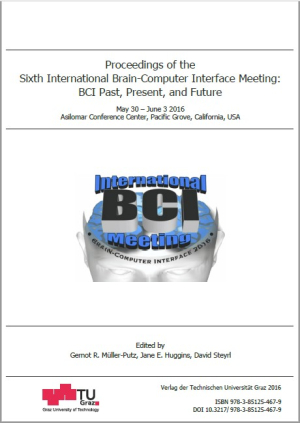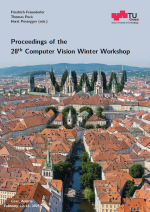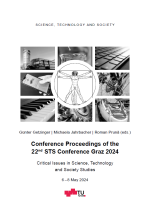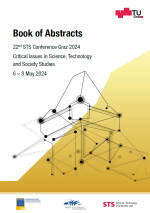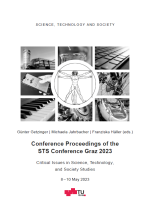Foreword
The International Brain-Computer Interface (BCI) Meeting Series occupies a unique place among conferences for BCI research by bringing together researchers and stakeholders from diverse disciplines. Neurologists, computer scientists, rehabilitation engineers, physicians, sensor engineers, psychologists, speech-language pathologists, ethicists, and actual BCI users are all active participants in the BCI Meeting Series. Further, the inclusive, retreat-like atmosphere of the BCI Meeting Series provides extensive opportunities for interaction anddevelopment of collaborations.Growing interest expressed in discussions over the course of the BCI Meeting Series (1999, 2002, 2005, 2010, and 2013) led to the establishment of the BCI Society in 2015. The purpose of this international society (http://bcisociety.org/) is “to foster research and development leading to technologies that enable people to interact with the world through brain signals.” To further this purpose, the BCI Society is organizing the SixthInternational BCI Meeting from May 30th– June 3rd, 2016 at the Asilomar Conference Grounds in Pacific Grove, California, United States. The 2016 BCI meeting has a theme of BCI: Past, Present, and Future. The diversity of BCI researchers represented in the planning of the 2016 BCI meeting has resulted in a vibrant, exciting Meeting with more collaborative, interactive activities and increased involvement from the many sectors that make up BCI research.The papers in these Proceedings show the diversity of applications for which BCIs are developed and the diversity of data and analyses that contribute to progress in BCI research and the development of BCI products. Intended applications for people with impairments include control of assistive devices, communication, and therapeutic effects for rehabilitation. Applications also extend beyond user groups of people with physical impairments. BCIs are being used for basic research to discover more about brain function, neural feedback and brain-training, and a variety of entertainment applications, both for people with impairments and for the general population.Together, the 2016 BCI Meeting and its Proceedings represent the breadth of BCI research and help us to build on the rich past of BCI research, leverage the diverse and exciting present, and create a future of BCIs as successful, beneficial tools both for people with disabilities and for the general populace. On behalf of the BCI Society and the Program Committee for the 2016 BCI meeting, I thank you for your interest in the BCI Meeting and hope to see you at this and future installments in the BCI Meeting Series.
Issue: Open Access E-Book
ISBN: 978-3-85125-467-9
Language: Englisch
Release date: June 2016
Foreword
The International Brain-Computer Interface (BCI) Meeting Series occupies a unique place among conferences for BCI research by bringing together researchers and stakeholders from diverse disciplines. Neurologists, computer scientists, rehabilitation engineers, physicians, sensor engineers, psychologists, speech-language pathologists, ethicists, and actual BCI users are all active participants in the BCI Meeting Series. Further, the inclusive, retreat-like atmosphere of the BCI Meeting Series provides extensive opportunities for interaction anddevelopment of collaborations.Growing interest expressed in discussions over the course of the BCI Meeting Series (1999, 2002, 2005, 2010, and 2013) led to the establishment of the BCI Society in 2015. The purpose of this international society (http://bcisociety.org/) is “to foster research and development leading to technologies that enable people to interact with the world through brain signals.” To further this purpose, the BCI Society is organizing the SixthInternational BCI Meeting from May 30th– June 3rd, 2016 at the Asilomar Conference Grounds in Pacific Grove, California, United States. The 2016 BCI meeting has a theme of BCI: Past, Present, and Future. The diversity of BCI researchers represented in the planning of the 2016 BCI meeting has resulted in a vibrant, exciting Meeting with more collaborative, interactive activities and increased involvement from the many sectors that make up BCI research.The papers in these Proceedings show the diversity of applications for which BCIs are developed and the diversity of data and analyses that contribute to progress in BCI research and the development of BCI products. Intended applications for people with impairments include control of assistive devices, communication, and therapeutic effects for rehabilitation. Applications also extend beyond user groups of people with physical impairments. BCIs are being used for basic research to discover more about brain function, neural feedback and brain-training, and a variety of entertainment applications, both for people with impairments and for the general population.Together, the 2016 BCI Meeting and its Proceedings represent the breadth of BCI research and help us to build on the rich past of BCI research, leverage the diverse and exciting present, and create a future of BCIs as successful, beneficial tools both for people with disabilities and for the general populace. On behalf of the BCI Society and the Program Committee for the 2016 BCI meeting, I thank you for your interest in the BCI Meeting and hope to see you at this and future installments in the BCI Meeting Series.
These could also be of interest to you
- Catalog
- New releases
-
Open Access publications

- Enhanced e-books
-
Series
- Akademische Reden an der Technischen Universität Graz
- Arbeitshilfen für die Praxis
- Archiv und Bibliothek
- Betonkolloquium
- Buddhist Architecture in the Western Himalayas
- BWL Schriftenreihe
- Electrical Power Systems
- Fachbücher Planung und Bau
- Facts & Figures
- Festschriften TU Graz
- Forschungsreihe IBBW
- Forum Technik und Gesellschaft
- Geodesy
- Immersive Learning Research Network Conference; Workshop, short papers, poster
- Institut für Gebäudelehre Jahrbuch
- International Brain-Computer Interface (BCI) Meeting
- LM.VM.2014
- Logistik Werkstatt Graz
- Materialien zu Schwerpunkten am Institut für Gebäudelehre
- Mathematical Modelling of Weld Phenomena
- Monographic Series TU Graz
- Monographic Series TU Graz|Advanced Materials Science
- Monographic Series TU Graz|Computation in Engineering and Science
- Monographic Series TU Graz|Production Science and Management
- Monographic Series TU Graz|Railway Research
- Monographic Series TU Graz|Reihe Fahrzeugtechnik
- Monographic Series TU Graz|Schriftenreihe des Instituts Betonbau
- Monographic Series TU Graz|Structural Analysis
- Monographic Series TU Graz|Techno- und sozioökonomisch orientierte Betriebswirtschaft
- Monographic Series TU Graz|Technoökonomie und industrielles Management
- Monographic Series TU Graz|Timber Engineering & Technology
- November Talks
- Proceedings of the International Brain-Computer Interface
- Schriftenreihe des Instituts für Baubetrieb und Bauwirtschaft
- Schriftenreihe des Instituts für Straßen- und Verkehrswesen
- Schriftenreihe des Instituts für Wohnbau der TU Graz
- Schriftenreihe zur Wasserwirtschaft
- Science, Technology and Society online
- Seminarreihe Bauunternehmensführung
- Studien zur Architektur | TU Graz
- Textbook Series
- Transform Industry: Guiding the transformation of SMEs
- TU Graz Jahresbericht | Annual report
- TU Graz people
- TU Graz Research
- VKM-THD Mitteilungen; IVT-Mitteilungen ab Bd. 100
- Authors
- Sale
Contact
Verlag der
Technischen Universität Graz
Technikerstraße 4
8010 Graz, Österreich
UID(VAT) ATU 57477929
contact person
Gabriele Groß
Tel.: +43(0)316 873 6157
E-Mail: verlag [ at ] tugraz.at
Privacy Overview
Necessary cookies are absolutely essential for the website to function properly. These cookies ensure basic functionalities and security features of the website, anonymously.
| Cookie | Dauer | Beschreibung |
|---|---|---|
| cookielawinfo-checkbox-analytics | 11 months | This cookie is set by GDPR Cookie Consent plugin. The cookie is used to store the user consent for the cookies in the category "Analytics". |
| cookielawinfo-checkbox-functional | 11 months | The cookie is set by GDPR cookie consent to record the user consent for the cookies in the category "Functional". |
| cookielawinfo-checkbox-necessary | 11 months | This cookie is set by GDPR Cookie Consent plugin. The cookies is used to store the user consent for the cookies in the category "Necessary". |
| qtrans_front_language | 1 year | This cookie is set by qTranslate WordPress plugin. The cookie is used to manage the preferred language of the visitor. |
| viewed_cookie_policy | 11 months | The cookie is set by the GDPR Cookie Consent plugin and is used to store whether or not user has consented to the use of cookies. It does not store any personal data. |
| woocommerce_cart_hash | session | This cookie is set by WooCommerce. The cookie helps WooCommerce determine when cart contents/data changes. |
Analytical cookies are used to understand how visitors interact with the website. These cookies help provide information on metrics the number of visitors, bounce rate, traffic source, etc.
| Cookie | Dauer | Beschreibung |
|---|---|---|
| _pk_id | 1 year 27 days | Required for the operation of Matomo, an analysis tool that tracks and analyzes user behavior. |
| _pk_ref | 13 months | Required for the operation of Matomo, an analysis tool that tracks and analyzes user behavior. |
| _pk_ses | 30 minutes | Required for the operation of Matomo, an analysis tool that tracks and analyzes user behavior. |
Other uncategorized cookies are those that are being analyzed and have not been classified into a category as yet.
| Cookie | Dauer | Beschreibung |
|---|---|---|
| yt-remote-connected-devices | never | No description available. |
| yt-remote-device-id | never | No description available. |

